Physics Assignment
VerifiedAdded on 2022/12/05
|18
|1727
|493
AI Summary
This Physics assignment covers topics such as velocity, acceleration, distance, circular motion, work energy theorem, double glazed windows, interference, and electric circuits.
Contribute Materials
Your contribution can guide someone’s learning journey. Share your
documents today.

Physics Assignment
Student Name:
Instructor Name:
Course Number:
26thApril 2019
Student Name:
Instructor Name:
Course Number:
26thApril 2019
Secure Best Marks with AI Grader
Need help grading? Try our AI Grader for instant feedback on your assignments.
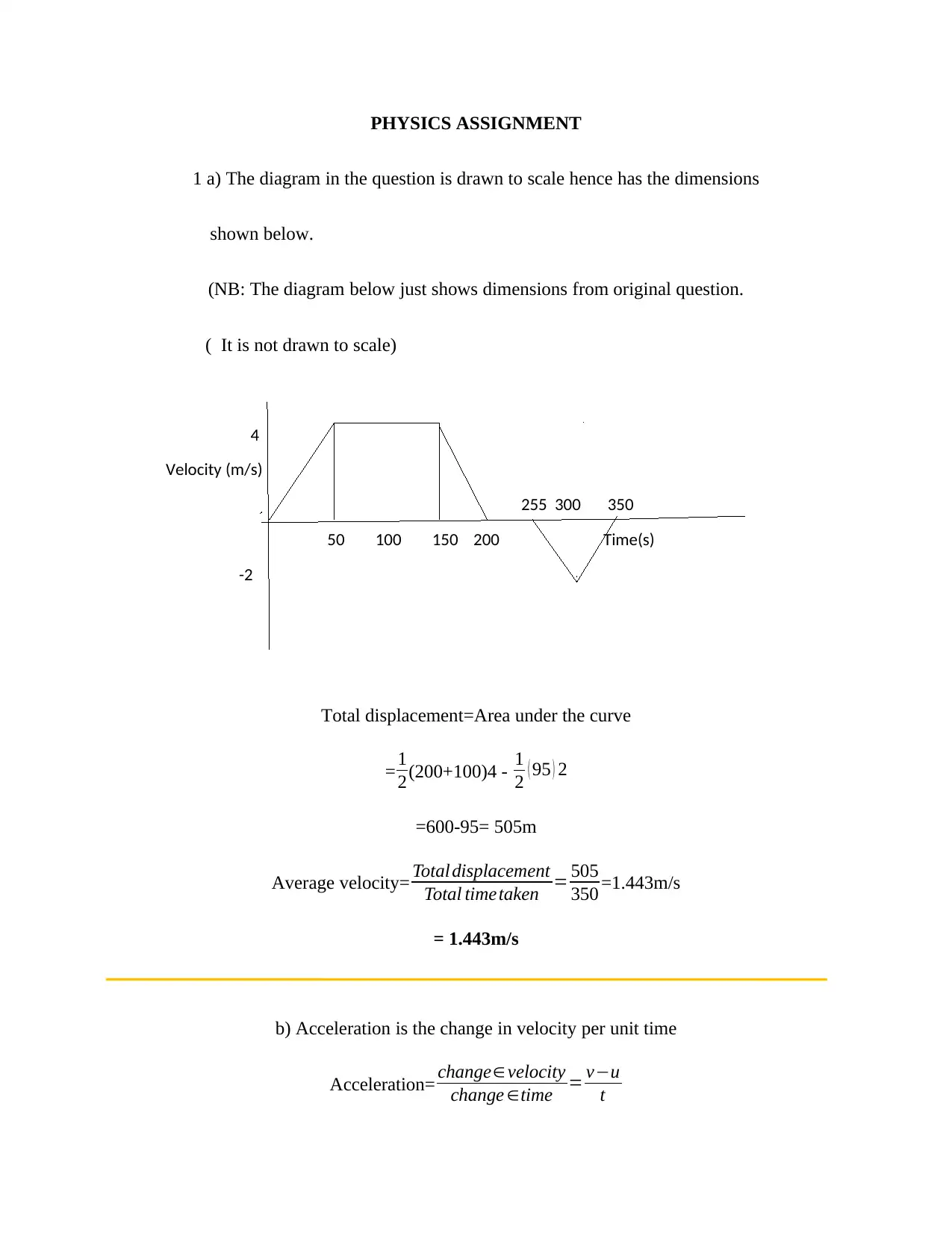
PHYSICS ASSIGNMENT
1 a) The diagram in the question is drawn to scale hence has the dimensions
shown below.
(NB: The diagram below just shows dimensions from original question.
( It is not drawn to scale)
4
Velocity (m/s)
255 300 350
50 100 150 200 Time(s)
-2
Total displacement=Area under the curve
= 1
2(200+100)4 - 1
2 ( 95 ) 2
=600-95= 505m
Average velocity= Total displacement
Total timetaken = 505
350 =1.443m/s
= 1.443m/s
b) Acceleration is the change in velocity per unit time
Acceleration= change∈velocity
change ∈time = v−u
t
1 a) The diagram in the question is drawn to scale hence has the dimensions
shown below.
(NB: The diagram below just shows dimensions from original question.
( It is not drawn to scale)
4
Velocity (m/s)
255 300 350
50 100 150 200 Time(s)
-2
Total displacement=Area under the curve
= 1
2(200+100)4 - 1
2 ( 95 ) 2
=600-95= 505m
Average velocity= Total displacement
Total timetaken = 505
350 =1.443m/s
= 1.443m/s
b) Acceleration is the change in velocity per unit time
Acceleration= change∈velocity
change ∈time = v−u
t
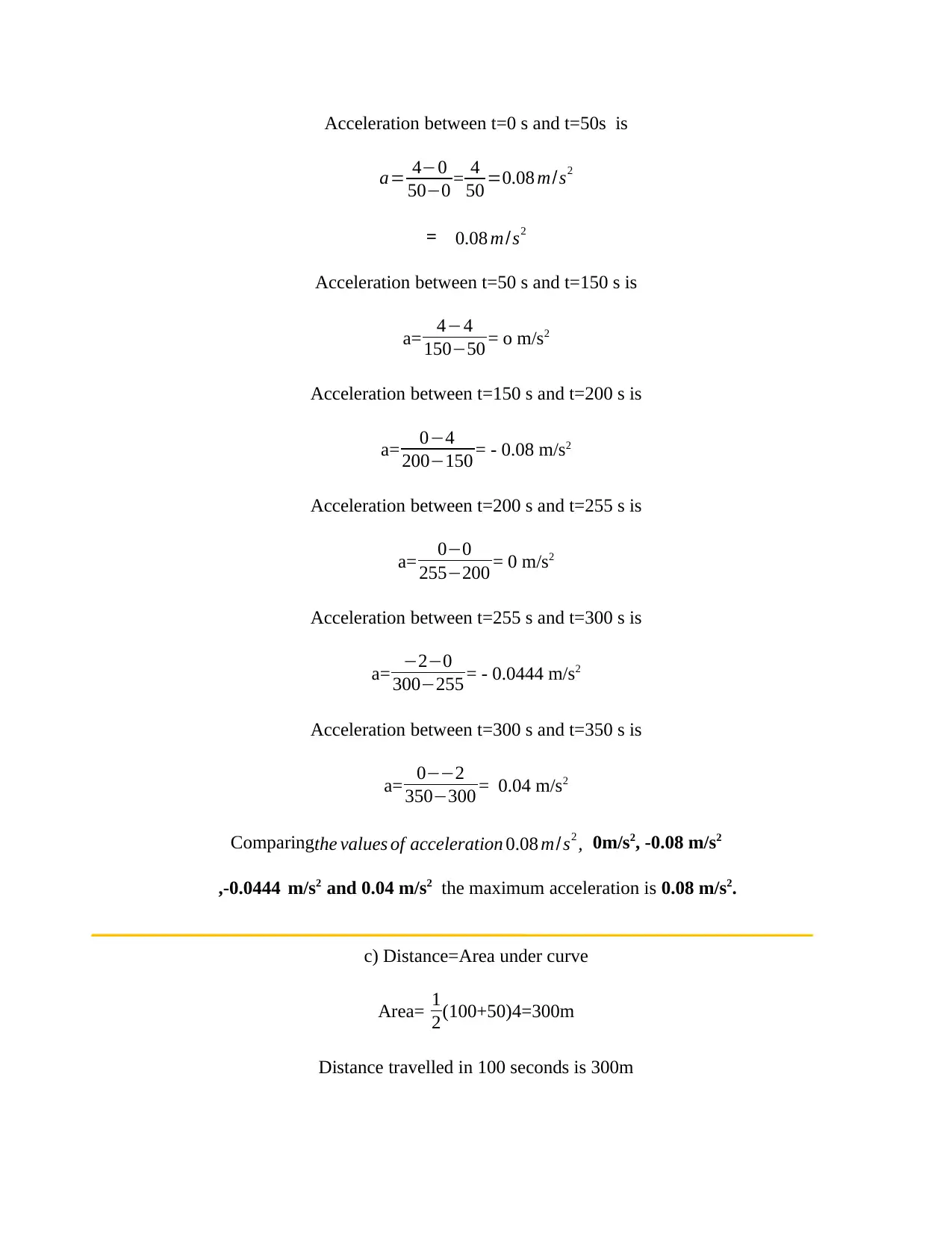
Acceleration between t=0 s and t=50s is
a= 4−0
50−0 = 4
50 =0.08 m/s2
= 0.08 m/s2
Acceleration between t=50 s and t=150 s is
a= 4−4
150−50 = o m/s2
Acceleration between t=150 s and t=200 s is
a= 0−4
200−150 = - 0.08 m/s2
Acceleration between t=200 s and t=255 s is
a= 0−0
255−200 = 0 m/s2
Acceleration between t=255 s and t=300 s is
a= −2−0
300−255 = - 0.0444 m/s2
Acceleration between t=300 s and t=350 s is
a= 0−−2
350−300 = 0.04 m/s2
Comparingthe values of acceleration 0.08 m/ s2 , 0m/s2, -0.08 m/s2
,-0.0444 m/s2 and 0.04 m/s2 the maximum acceleration is 0.08 m/s2.
c) Distance=Area under curve
Area= 1
2(100+50)4=300m
Distance travelled in 100 seconds is 300m
a= 4−0
50−0 = 4
50 =0.08 m/s2
= 0.08 m/s2
Acceleration between t=50 s and t=150 s is
a= 4−4
150−50 = o m/s2
Acceleration between t=150 s and t=200 s is
a= 0−4
200−150 = - 0.08 m/s2
Acceleration between t=200 s and t=255 s is
a= 0−0
255−200 = 0 m/s2
Acceleration between t=255 s and t=300 s is
a= −2−0
300−255 = - 0.0444 m/s2
Acceleration between t=300 s and t=350 s is
a= 0−−2
350−300 = 0.04 m/s2
Comparingthe values of acceleration 0.08 m/ s2 , 0m/s2, -0.08 m/s2
,-0.0444 m/s2 and 0.04 m/s2 the maximum acceleration is 0.08 m/s2.
c) Distance=Area under curve
Area= 1
2(100+50)4=300m
Distance travelled in 100 seconds is 300m
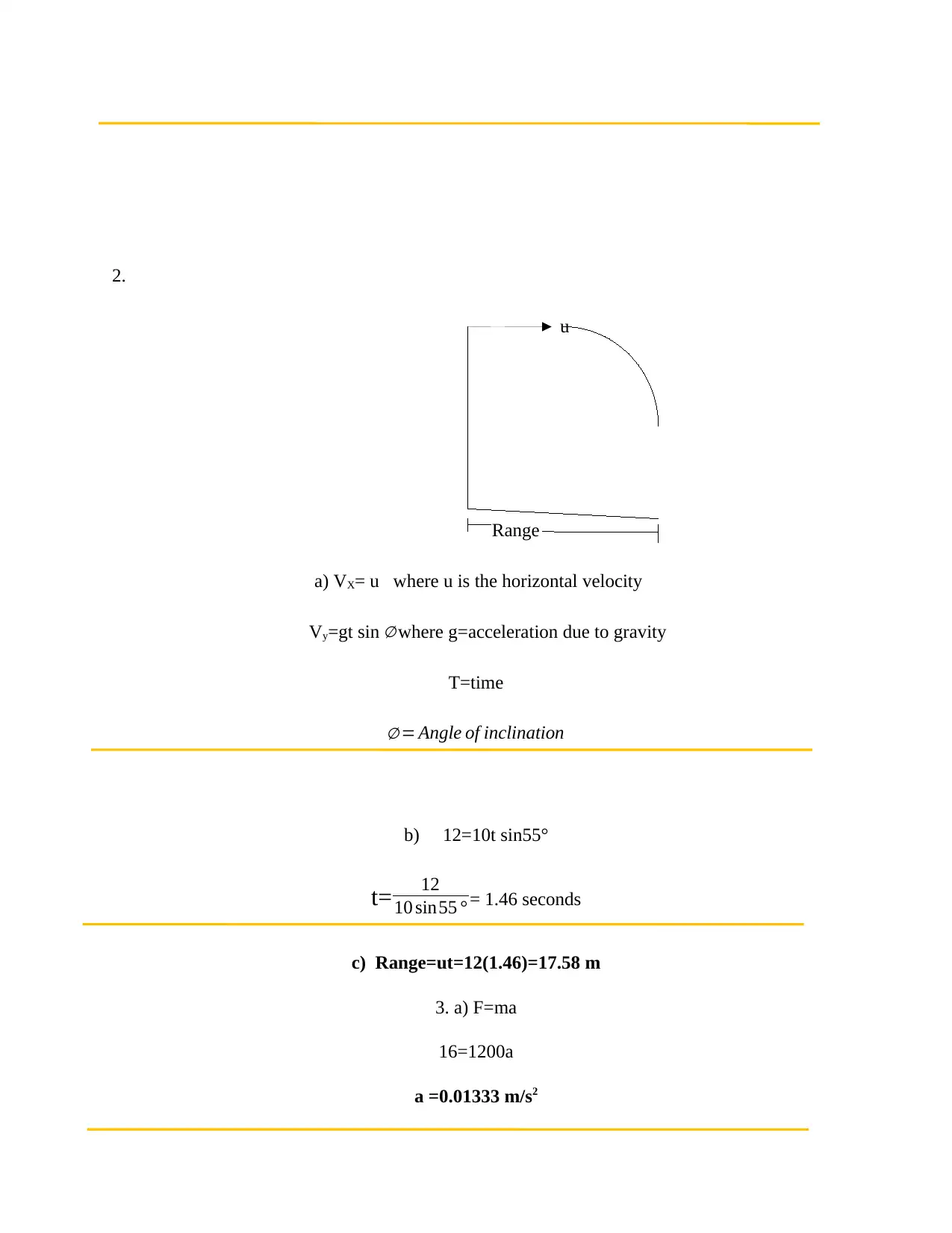
2.
u
Range
a) VX= u where u is the horizontal velocity
Vy=gt sin ∅ where g=acceleration due to gravity
T=time
∅ = Angle of inclination
b) 12=10t sin55°
t= 12
10 sin55 ° = 1.46 seconds
c) Range=ut=12(1.46)=17.58 m
3. a) F=ma
16=1200a
a =0.01333 m/s2
u
Range
a) VX= u where u is the horizontal velocity
Vy=gt sin ∅ where g=acceleration due to gravity
T=time
∅ = Angle of inclination
b) 12=10t sin55°
t= 12
10 sin55 ° = 1.46 seconds
c) Range=ut=12(1.46)=17.58 m
3. a) F=ma
16=1200a
a =0.01333 m/s2
Secure Best Marks with AI Grader
Need help grading? Try our AI Grader for instant feedback on your assignments.
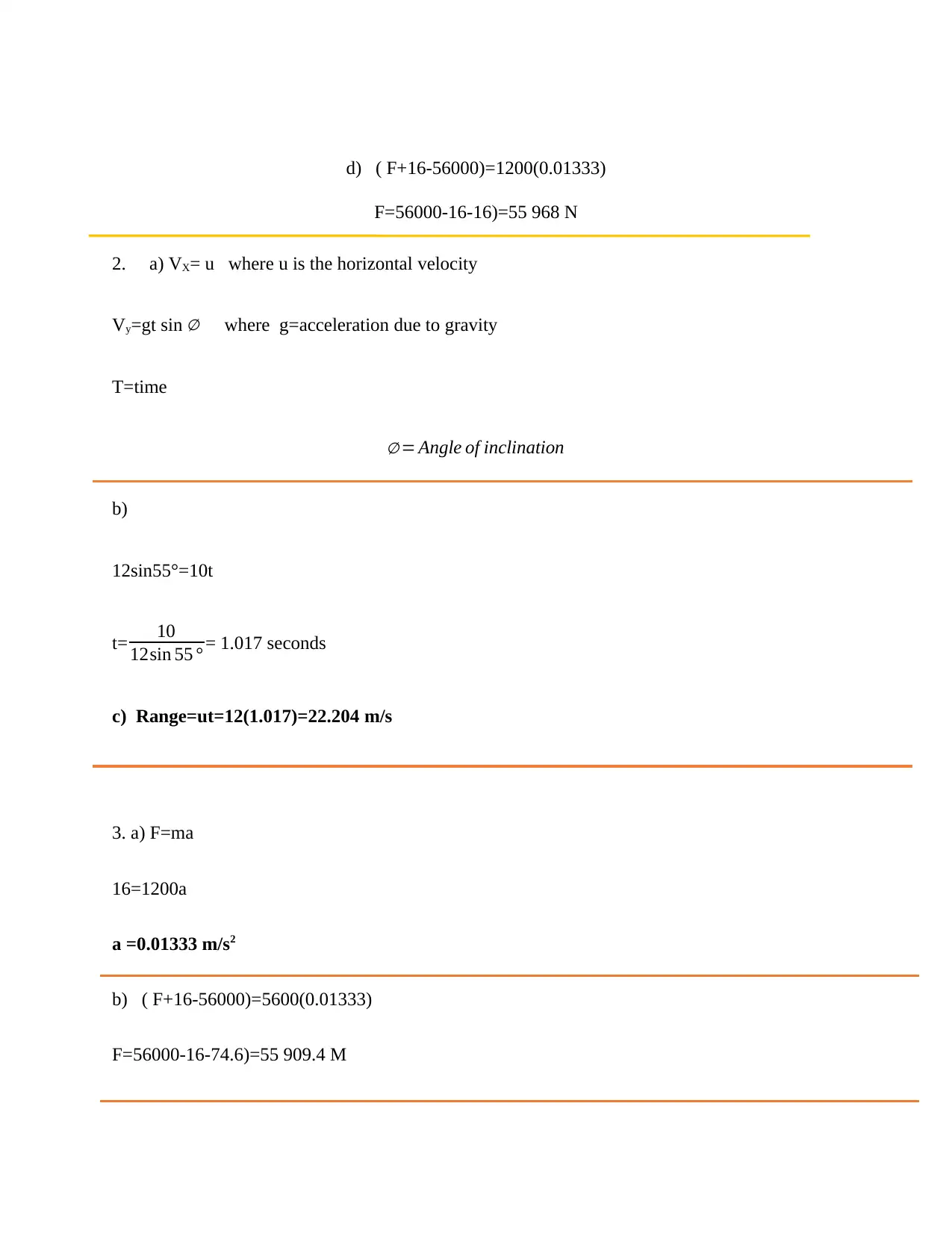
d) ( F+16-56000)=1200(0.01333)
F=56000-16-16)=55 968 N
2. a) VX= u where u is the horizontal velocity
Vy=gt sin ∅ where g=acceleration due to gravity
T=time
∅ = Angle of inclination
b)
12sin55°=10t
t= 10
12sin 55 ° = 1.017 seconds
c) Range=ut=12(1.017)=22.204 m/s
3. a) F=ma
16=1200a
a =0.01333 m/s2
b) ( F+16-56000)=5600(0.01333)
F=56000-16-74.6)=55 909.4 M
F=56000-16-16)=55 968 N
2. a) VX= u where u is the horizontal velocity
Vy=gt sin ∅ where g=acceleration due to gravity
T=time
∅ = Angle of inclination
b)
12sin55°=10t
t= 10
12sin 55 ° = 1.017 seconds
c) Range=ut=12(1.017)=22.204 m/s
3. a) F=ma
16=1200a
a =0.01333 m/s2
b) ( F+16-56000)=5600(0.01333)
F=56000-16-74.6)=55 909.4 M
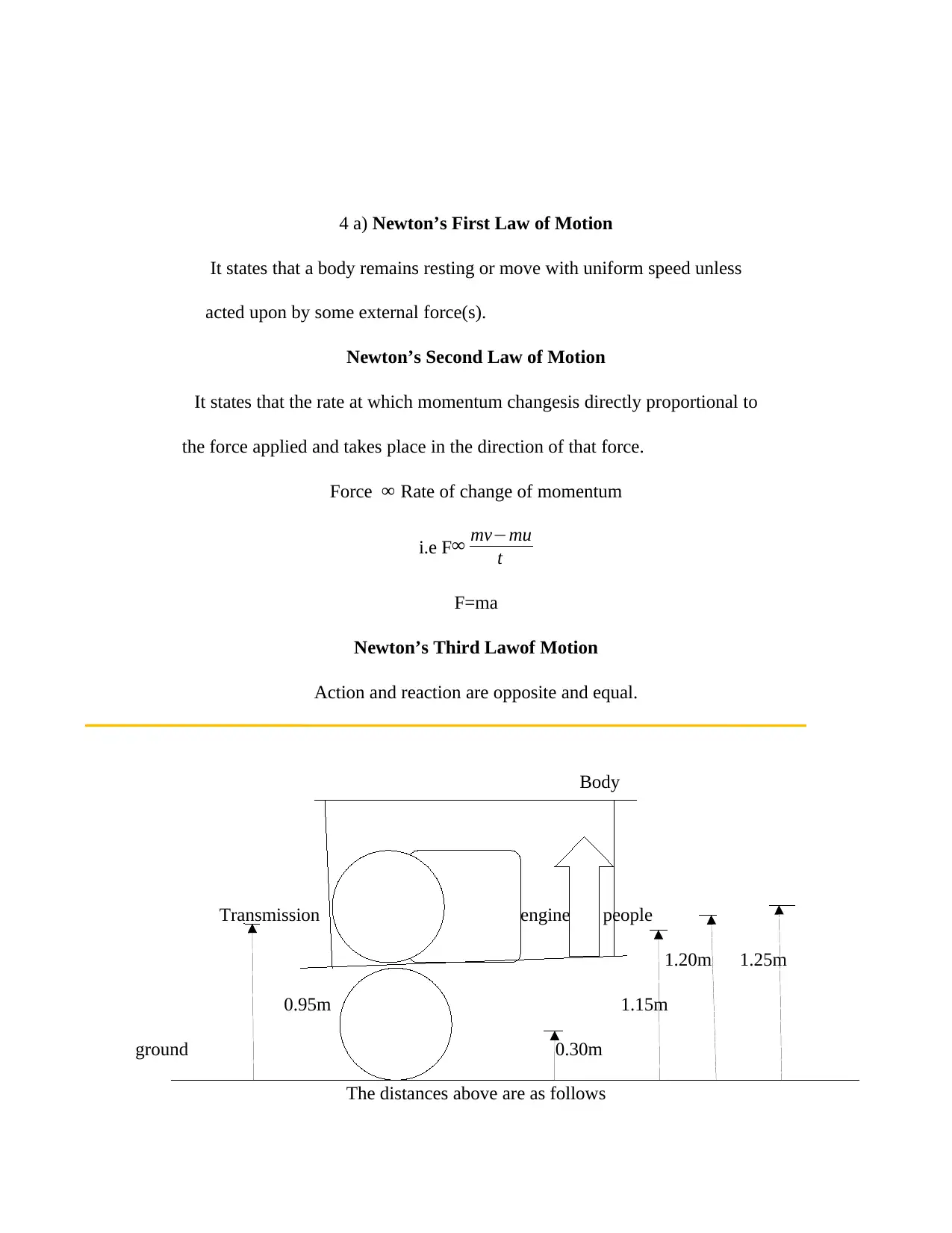
4 a) Newton’s First Law of Motion
It states that a body remains resting or move with uniform speed unless
acted upon by some external force(s).
Newton’s Second Law of Motion
It states that the rate at which momentum changesis directly proportional to
the force applied and takes place in the direction of that force.
Force ∞ Rate of change of momentum
i.e F∞ mv−mu
t
F=ma
Newton’s Third Lawof Motion
Action and reaction are opposite and equal.
Body
Transmission engine pp people
1.20m 1.25m
0.95m wheels 1.15m
ground 0.30m
The distances above are as follows
It states that a body remains resting or move with uniform speed unless
acted upon by some external force(s).
Newton’s Second Law of Motion
It states that the rate at which momentum changesis directly proportional to
the force applied and takes place in the direction of that force.
Force ∞ Rate of change of momentum
i.e F∞ mv−mu
t
F=ma
Newton’s Third Lawof Motion
Action and reaction are opposite and equal.
Body
Transmission engine pp people
1.20m 1.25m
0.95m wheels 1.15m
ground 0.30m
The distances above are as follows
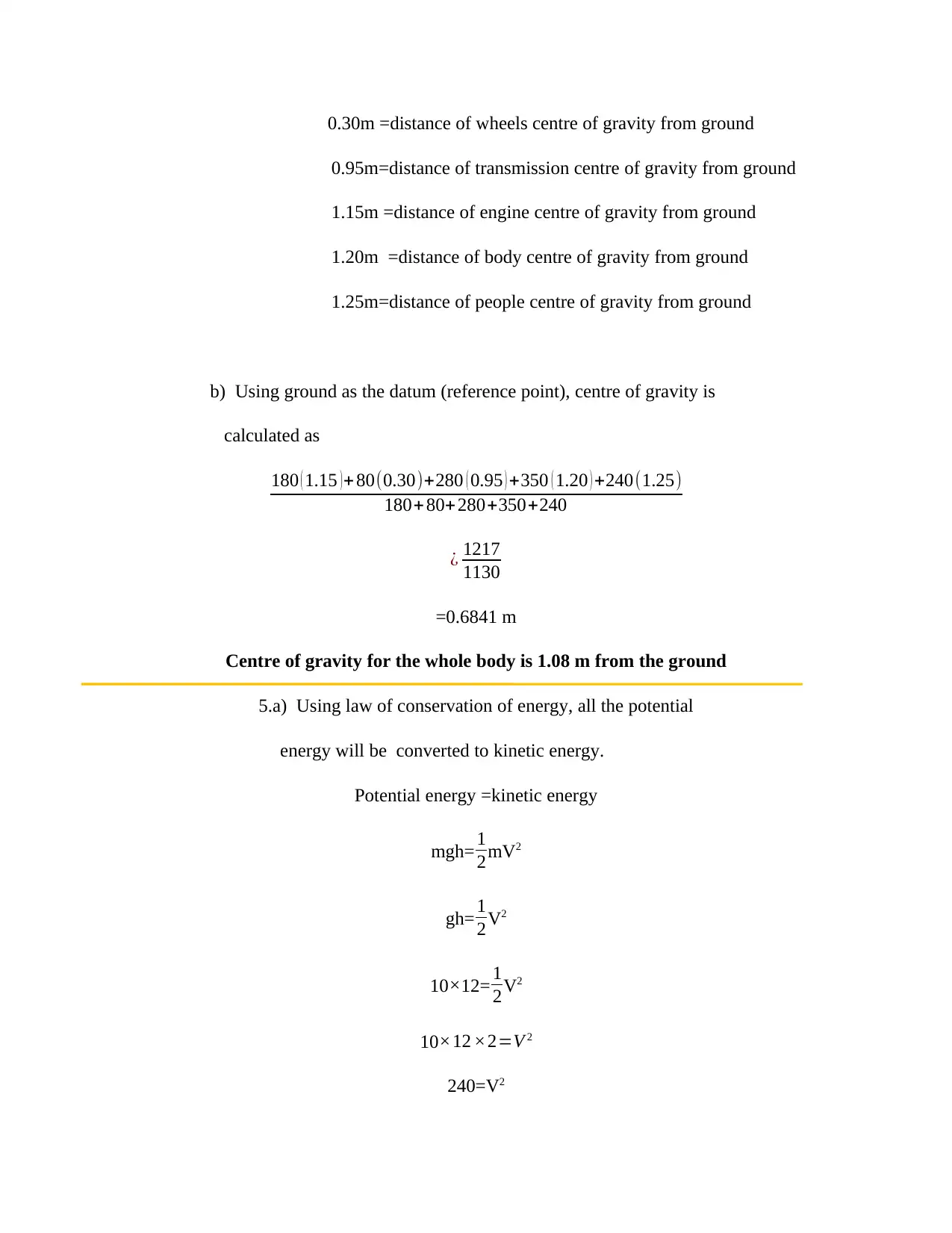
0.30m =distance of wheels centre of gravity from ground
0.95m=distance of transmission centre of gravity from ground
1.15m =distance of engine centre of gravity from ground
1.20m =distance of body centre of gravity from ground
1.25m=distance of people centre of gravity from ground
b) Using ground as the datum (reference point), centre of gravity is
calculated as
180 ( 1.15 ) + 80(0.30)+280 ( 0.95 ) +350 ( 1.20 ) +240(1.25)
180+ 80+ 280+350+240
¿ 1217
1130
=0.6841 m
Centre of gravity for the whole body is 1.08 m from the ground
5.a) Using law of conservation of energy, all the potential
energy will be converted to kinetic energy.
Potential energy =kinetic energy
mgh= 1
2mV2
gh= 1
2V2
10×12= 1
2V2
10×12 ×2=V 2
240=V2
0.95m=distance of transmission centre of gravity from ground
1.15m =distance of engine centre of gravity from ground
1.20m =distance of body centre of gravity from ground
1.25m=distance of people centre of gravity from ground
b) Using ground as the datum (reference point), centre of gravity is
calculated as
180 ( 1.15 ) + 80(0.30)+280 ( 0.95 ) +350 ( 1.20 ) +240(1.25)
180+ 80+ 280+350+240
¿ 1217
1130
=0.6841 m
Centre of gravity for the whole body is 1.08 m from the ground
5.a) Using law of conservation of energy, all the potential
energy will be converted to kinetic energy.
Potential energy =kinetic energy
mgh= 1
2mV2
gh= 1
2V2
10×12= 1
2V2
10×12 ×2=V 2
240=V2
Paraphrase This Document
Need a fresh take? Get an instant paraphrase of this document with our AI Paraphraser
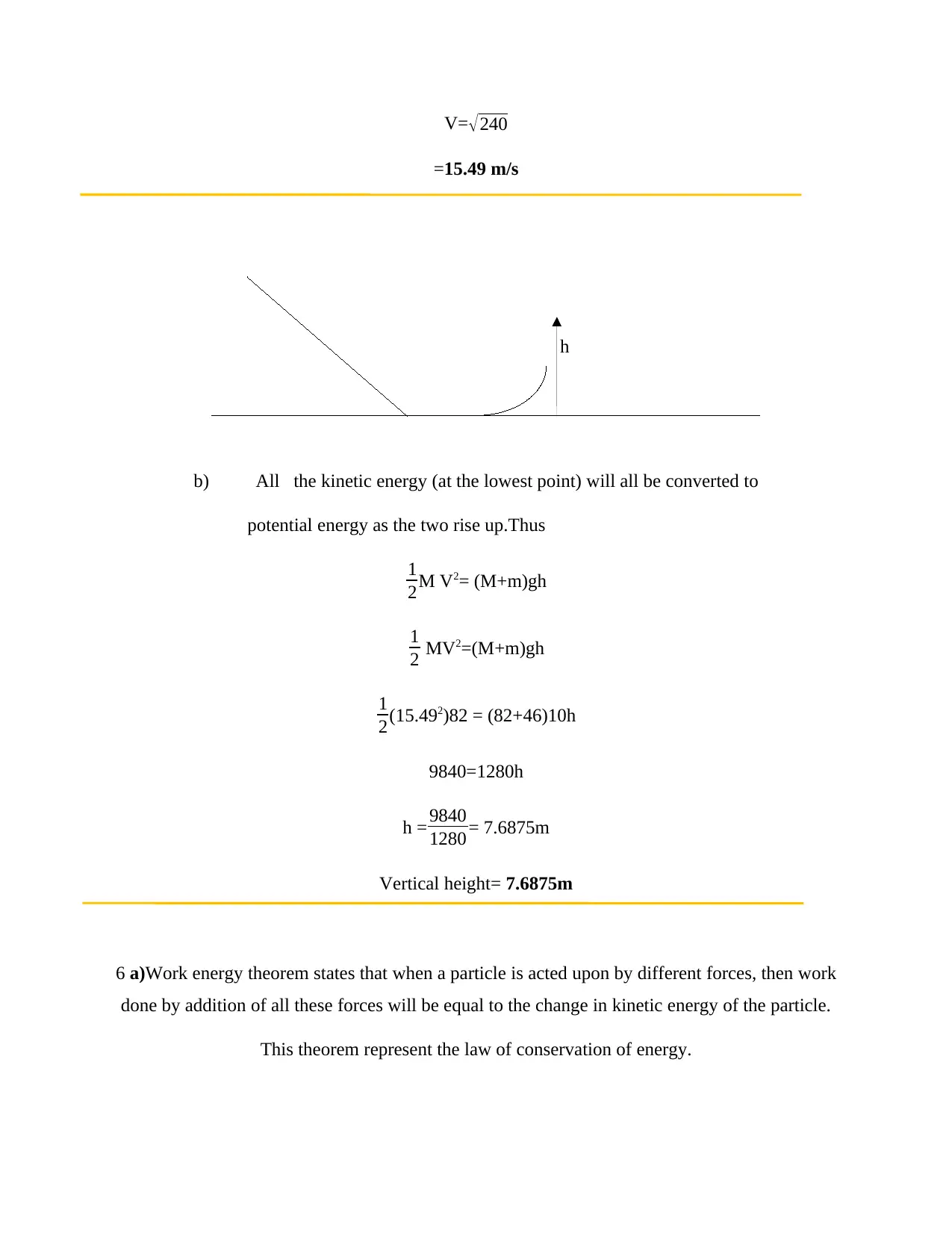
V=√240
=15.49 m/s
h
b) All the kinetic energy (at the lowest point) will all be converted to
potential energy as the two rise up.Thus
1
2M V2= (M+m)gh
1
2 MV2=(M+m)gh
1
2(15.492)82 = (82+46)10h
9840=1280h
h = 9840
1280 = 7.6875m
Vertical height= 7.6875m
6 a)Work energy theorem states that when a particle is acted upon by different forces, then work
done by addition of all these forces will be equal to the change in kinetic energy of the particle.
This theorem represent the law of conservation of energy.
=15.49 m/s
h
b) All the kinetic energy (at the lowest point) will all be converted to
potential energy as the two rise up.Thus
1
2M V2= (M+m)gh
1
2 MV2=(M+m)gh
1
2(15.492)82 = (82+46)10h
9840=1280h
h = 9840
1280 = 7.6875m
Vertical height= 7.6875m
6 a)Work energy theorem states that when a particle is acted upon by different forces, then work
done by addition of all these forces will be equal to the change in kinetic energy of the particle.
This theorem represent the law of conservation of energy.
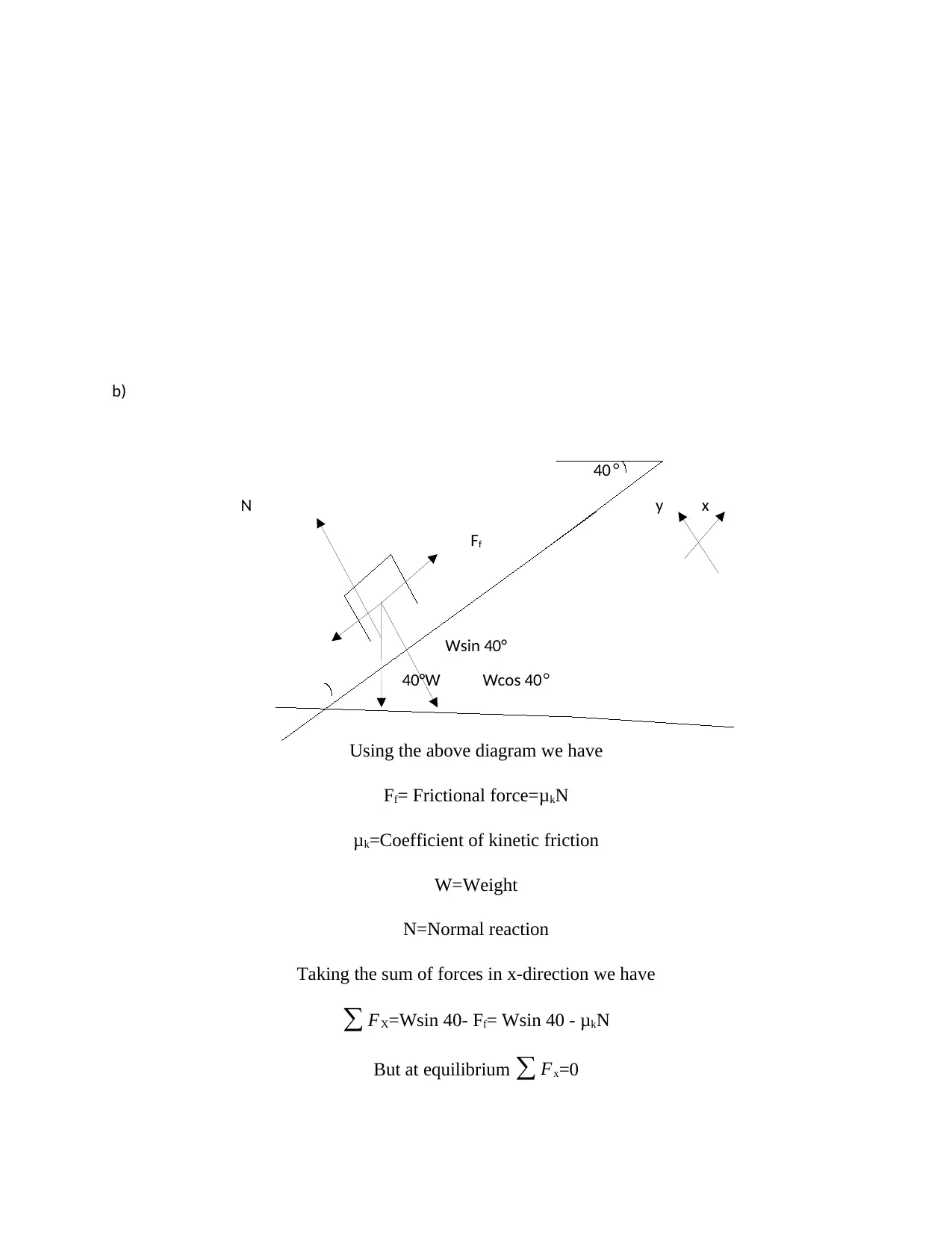
b)
40°
N y x
Ff
Wsin 40°
40°W Wcos 40°
Using the above diagram we have
Ff= Frictional force=μkN
μk=Coefficient of kinetic friction
W=Weight
N=Normal reaction
Taking the sum of forces in x-direction we have
∑ FX=Wsin 40- Ff= Wsin 40 - μkN
But at equilibrium ∑ Fx=0
40°
N y x
Ff
Wsin 40°
40°W Wcos 40°
Using the above diagram we have
Ff= Frictional force=μkN
μk=Coefficient of kinetic friction
W=Weight
N=Normal reaction
Taking the sum of forces in x-direction we have
∑ FX=Wsin 40- Ff= Wsin 40 - μkN
But at equilibrium ∑ Fx=0
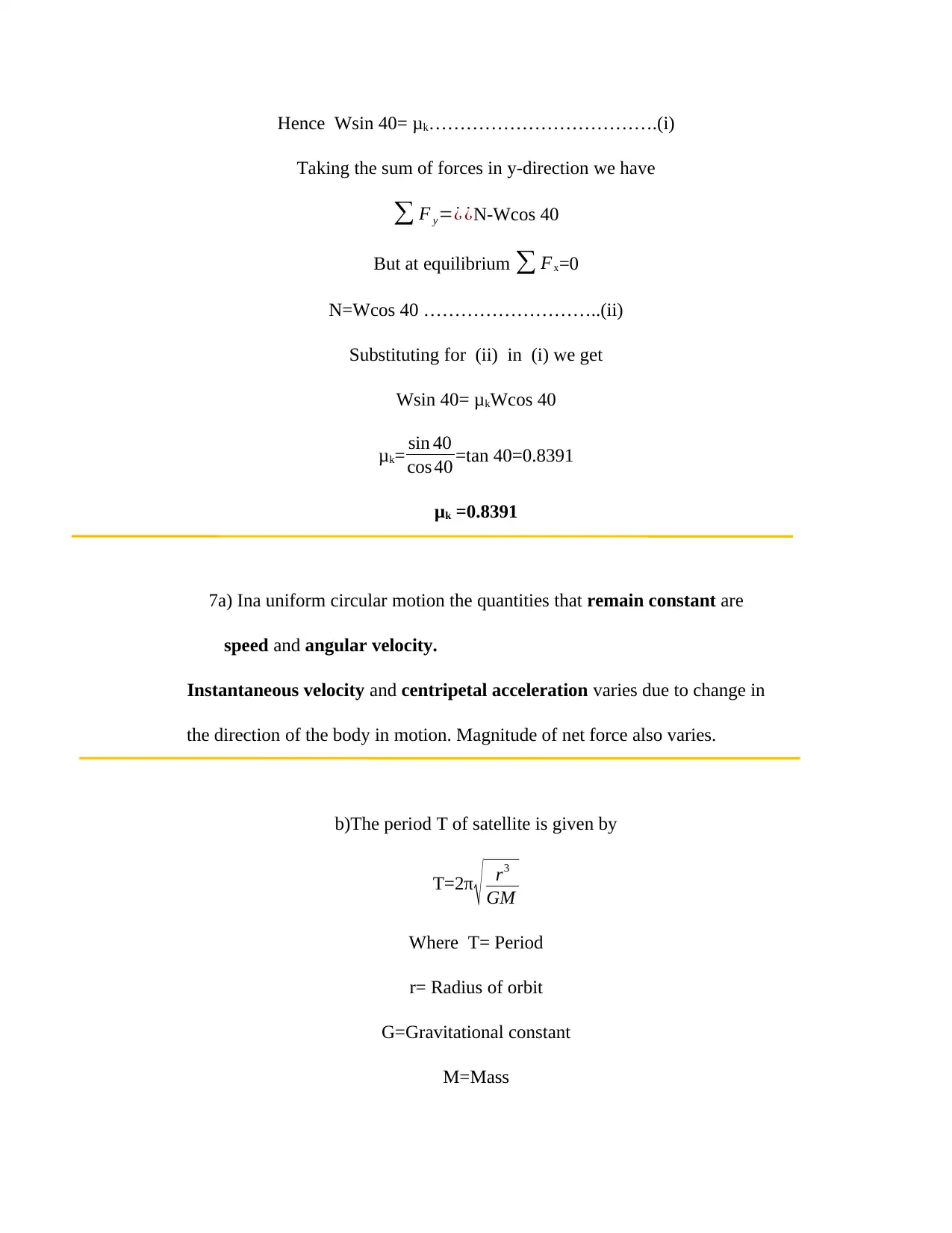
Hence Wsin 40= μk……………………………….(i)
Taking the sum of forces in y-direction we have
∑ F y=¿ ¿N-Wcos 40
But at equilibrium ∑ Fx=0
N=Wcos 40 ………………………..(ii)
Substituting for (ii) in (i) we get
Wsin 40= μkWcos 40
μk= sin 40
cos 40 =tan 40=0.8391
μk =0.8391
7a) Ina uniform circular motion the quantities that remain constant are
speed and angular velocity.
Instantaneous velocity and centripetal acceleration varies due to change in
the direction of the body in motion. Magnitude of net force also varies.
b)The period T of satellite is given by
T=2π √ r3
GM
Where T= Period
r= Radius of orbit
G=Gravitational constant
M=Mass
Taking the sum of forces in y-direction we have
∑ F y=¿ ¿N-Wcos 40
But at equilibrium ∑ Fx=0
N=Wcos 40 ………………………..(ii)
Substituting for (ii) in (i) we get
Wsin 40= μkWcos 40
μk= sin 40
cos 40 =tan 40=0.8391
μk =0.8391
7a) Ina uniform circular motion the quantities that remain constant are
speed and angular velocity.
Instantaneous velocity and centripetal acceleration varies due to change in
the direction of the body in motion. Magnitude of net force also varies.
b)The period T of satellite is given by
T=2π √ r3
GM
Where T= Period
r= Radius of orbit
G=Gravitational constant
M=Mass
Secure Best Marks with AI Grader
Need help grading? Try our AI Grader for instant feedback on your assignments.
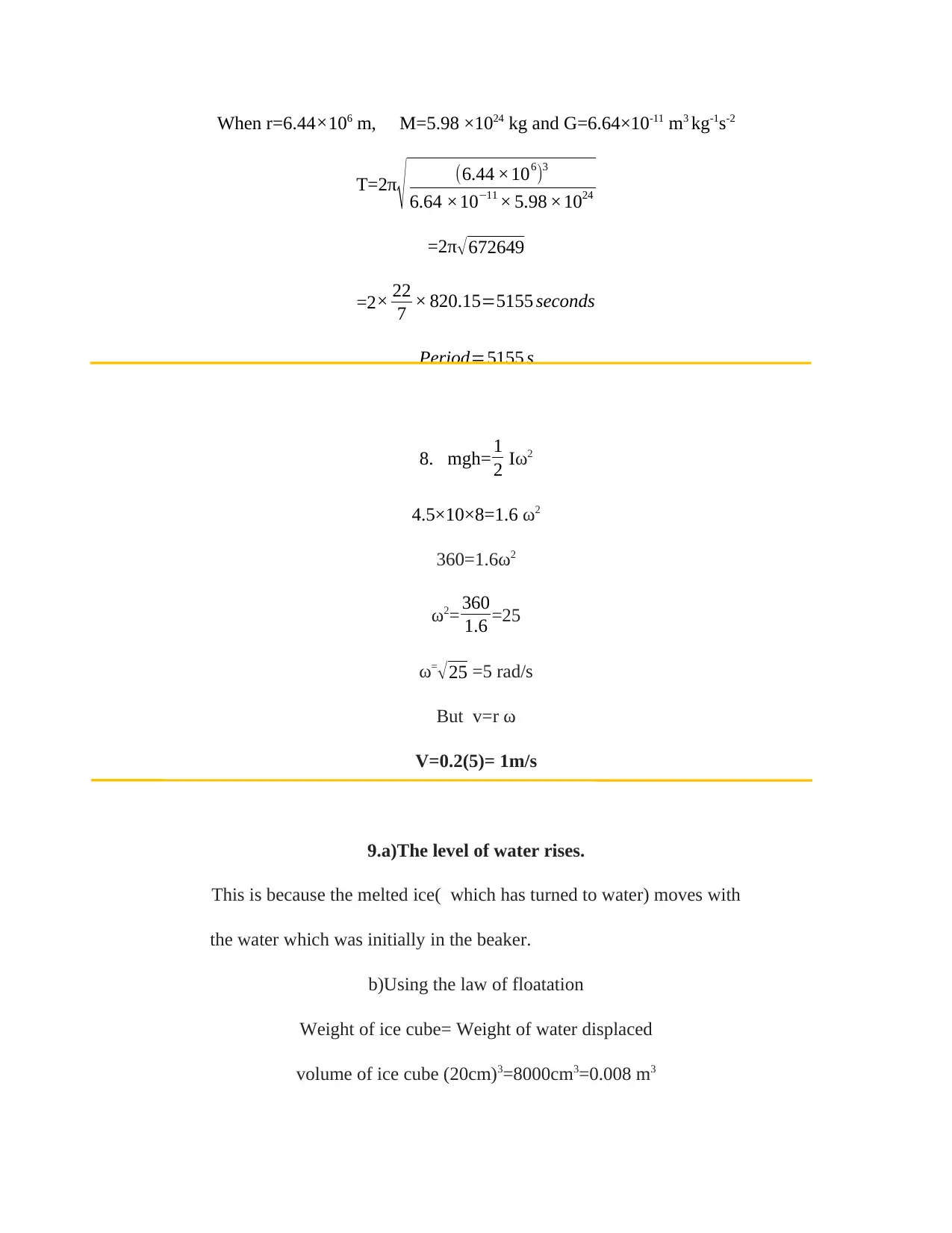
When r=6.44×106 m, M=5.98 ×1024 kg and G=6.64×10-11 m3 kg-1s-2
T=2π
√ (6.44 ×106)3
6.64 ×10−11 × 5.98 ×1024
=2π√ 672649
=2× 22
7 × 820.15=5155 seconds
Period=5155 s
8. mgh= 1
2 Iω2
4.5×10×8=1.6 ω2
360=1.6ω2
ω2= 360
1.6 =25
ω=
√25 =5 rad/s
But v=r ω
V=0.2(5)= 1m/s
9.a)The level of water rises.
This is because the melted ice( which has turned to water) moves with
the water which was initially in the beaker.
b)Using the law of floatation
Weight of ice cube= Weight of water displaced
volume of ice cube (20cm)3=8000cm3=0.008 m3
T=2π
√ (6.44 ×106)3
6.64 ×10−11 × 5.98 ×1024
=2π√ 672649
=2× 22
7 × 820.15=5155 seconds
Period=5155 s
8. mgh= 1
2 Iω2
4.5×10×8=1.6 ω2
360=1.6ω2
ω2= 360
1.6 =25
ω=
√25 =5 rad/s
But v=r ω
V=0.2(5)= 1m/s
9.a)The level of water rises.
This is because the melted ice( which has turned to water) moves with
the water which was initially in the beaker.
b)Using the law of floatation
Weight of ice cube= Weight of water displaced
volume of ice cube (20cm)3=8000cm3=0.008 m3
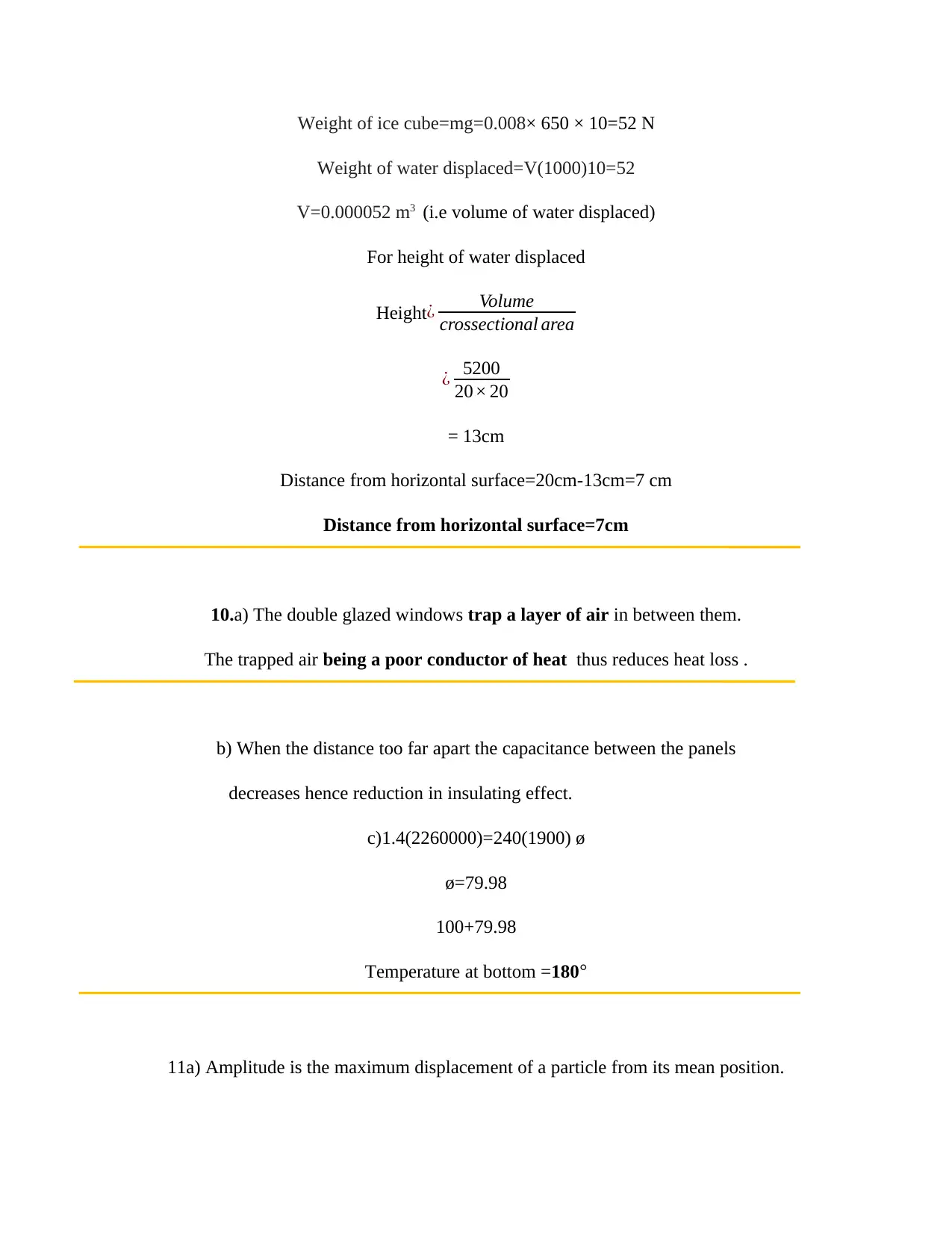
Weight of ice cube=mg=0.008× 650 × 10=52 N
Weight of water displaced=V(1000)10=52
V=0.000052 m3 (i.e volume of water displaced)
For height of water displaced
Height¿ Volume
crossectional area
¿ 5200
20× 20
= 13cm
Distance from horizontal surface=20cm-13cm=7 cm
Distance from horizontal surface=7cm
10.a) The double glazed windows trap a layer of air in between them.
The trapped air being a poor conductor of heat thus reduces heat loss .
b) When the distance too far apart the capacitance between the panels
decreases hence reduction in insulating effect.
c)1.4(2260000)=240(1900) ø
ø=79.98
100+79.98
Temperature at bottom =180°
11a) Amplitude is the maximum displacement of a particle from its mean position.
Weight of water displaced=V(1000)10=52
V=0.000052 m3 (i.e volume of water displaced)
For height of water displaced
Height¿ Volume
crossectional area
¿ 5200
20× 20
= 13cm
Distance from horizontal surface=20cm-13cm=7 cm
Distance from horizontal surface=7cm
10.a) The double glazed windows trap a layer of air in between them.
The trapped air being a poor conductor of heat thus reduces heat loss .
b) When the distance too far apart the capacitance between the panels
decreases hence reduction in insulating effect.
c)1.4(2260000)=240(1900) ø
ø=79.98
100+79.98
Temperature at bottom =180°
11a) Amplitude is the maximum displacement of a particle from its mean position.
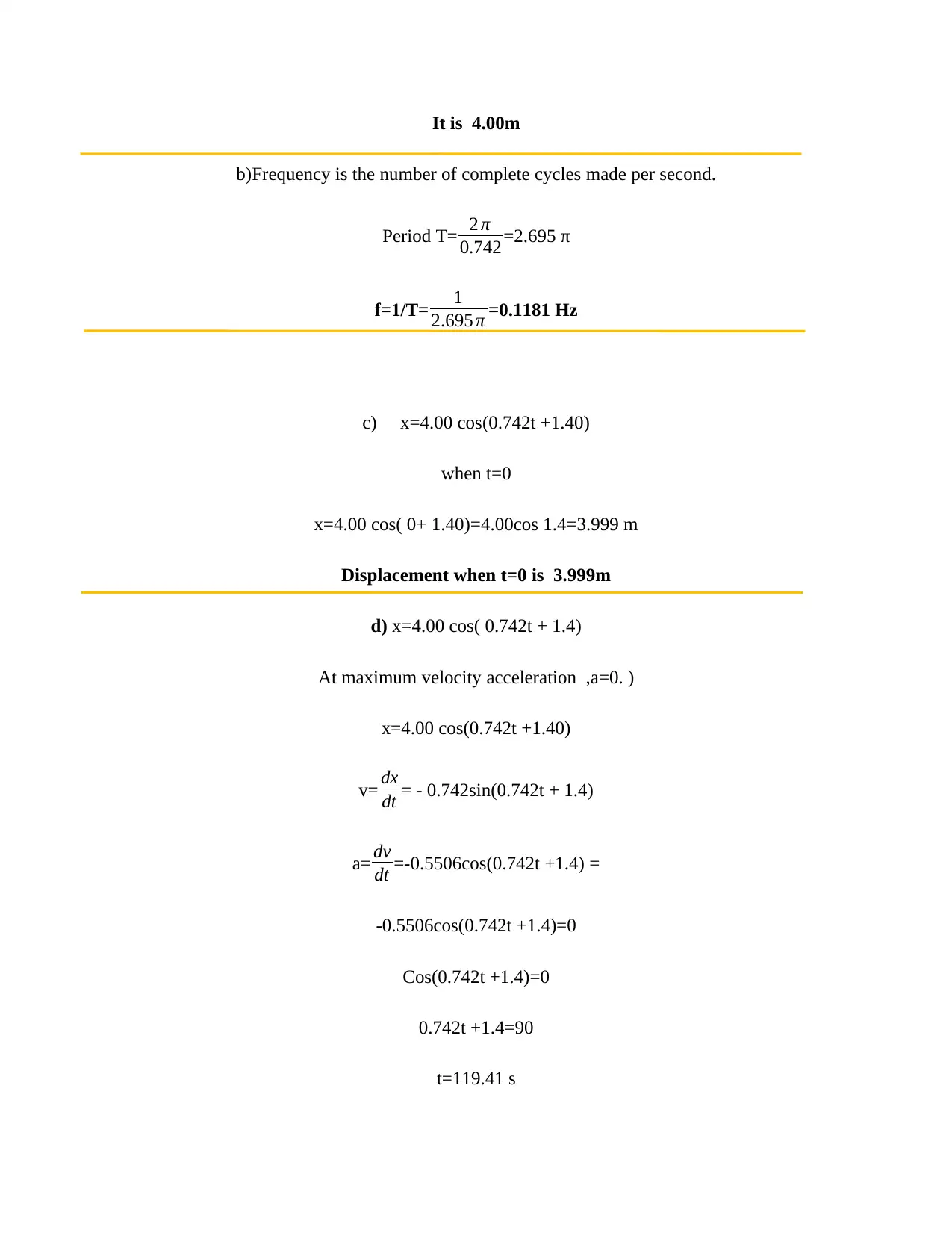
It is 4.00m
b)Frequency is the number of complete cycles made per second.
Period T= 2 π
0.742=2.695 π
f=1/T= 1
2.695 π =0.1181 Hz
c) x=4.00 cos(0.742t +1.40)
when t=0
x=4.00 cos( 0+ 1.40)=4.00cos 1.4=3.999 m
Displacement when t=0 is 3.999m
d) x=4.00 cos( 0.742t + 1.4)
At maximum velocity acceleration ,a=0. )
x=4.00 cos(0.742t +1.40)
v= dx
dt = - 0.742sin(0.742t + 1.4)
a= dv
dt =-0.5506cos(0.742t +1.4) =
-0.5506cos(0.742t +1.4)=0
Cos(0.742t +1.4)=0
0.742t +1.4=90
t=119.41 s
b)Frequency is the number of complete cycles made per second.
Period T= 2 π
0.742=2.695 π
f=1/T= 1
2.695 π =0.1181 Hz
c) x=4.00 cos(0.742t +1.40)
when t=0
x=4.00 cos( 0+ 1.40)=4.00cos 1.4=3.999 m
Displacement when t=0 is 3.999m
d) x=4.00 cos( 0.742t + 1.4)
At maximum velocity acceleration ,a=0. )
x=4.00 cos(0.742t +1.40)
v= dx
dt = - 0.742sin(0.742t + 1.4)
a= dv
dt =-0.5506cos(0.742t +1.4) =
-0.5506cos(0.742t +1.4)=0
Cos(0.742t +1.4)=0
0.742t +1.4=90
t=119.41 s
Paraphrase This Document
Need a fresh take? Get an instant paraphrase of this document with our AI Paraphraser
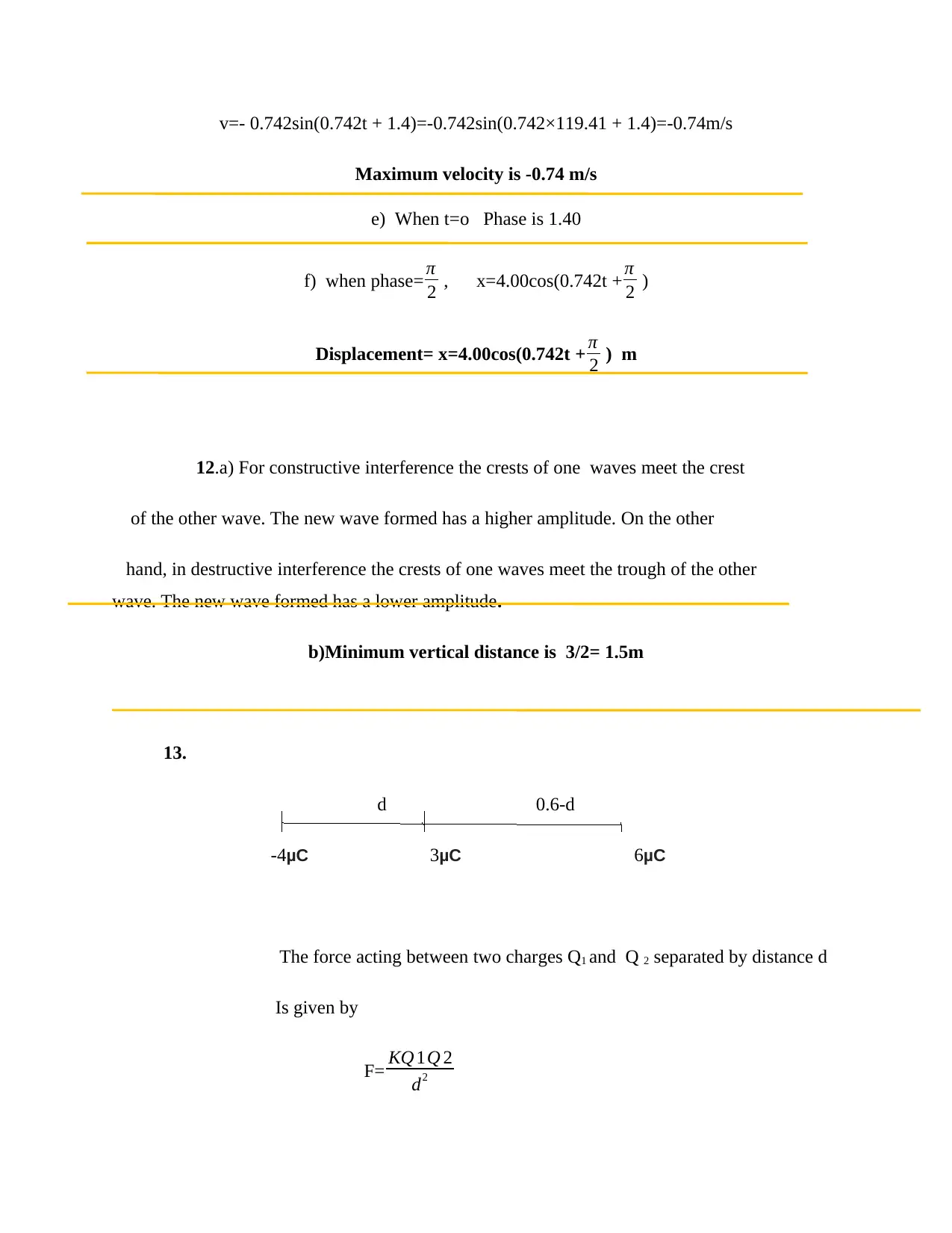
v=- 0.742sin(0.742t + 1.4)=-0.742sin(0.742×119.41 + 1.4)=-0.74m/s
Maximum velocity is -0.74 m/s
e) When t=o Phase is 1.40
f) when phase= π
2 , x=4.00cos(0.742t + π
2 )
Displacement= x=4.00cos(0.742t + π
2 ) m
12.a) For constructive interference the crests of one waves meet the crest
of the other wave. The new wave formed has a higher amplitude. On the other
hand, in destructive interference the crests of one waves meet the trough of the other
wave. The new wave formed has a lower amplitude.
b)Minimum vertical distance is 3/2= 1.5m
13.
d 0.6-d
-4μC 3μC 6μC
The force acting between two charges Q1 and Q 2 separated by distance d
Is given by
F= KQ 1Q 2
d2
Maximum velocity is -0.74 m/s
e) When t=o Phase is 1.40
f) when phase= π
2 , x=4.00cos(0.742t + π
2 )
Displacement= x=4.00cos(0.742t + π
2 ) m
12.a) For constructive interference the crests of one waves meet the crest
of the other wave. The new wave formed has a higher amplitude. On the other
hand, in destructive interference the crests of one waves meet the trough of the other
wave. The new wave formed has a lower amplitude.
b)Minimum vertical distance is 3/2= 1.5m
13.
d 0.6-d
-4μC 3μC 6μC
The force acting between two charges Q1 and Q 2 separated by distance d
Is given by
F= KQ 1Q 2
d2
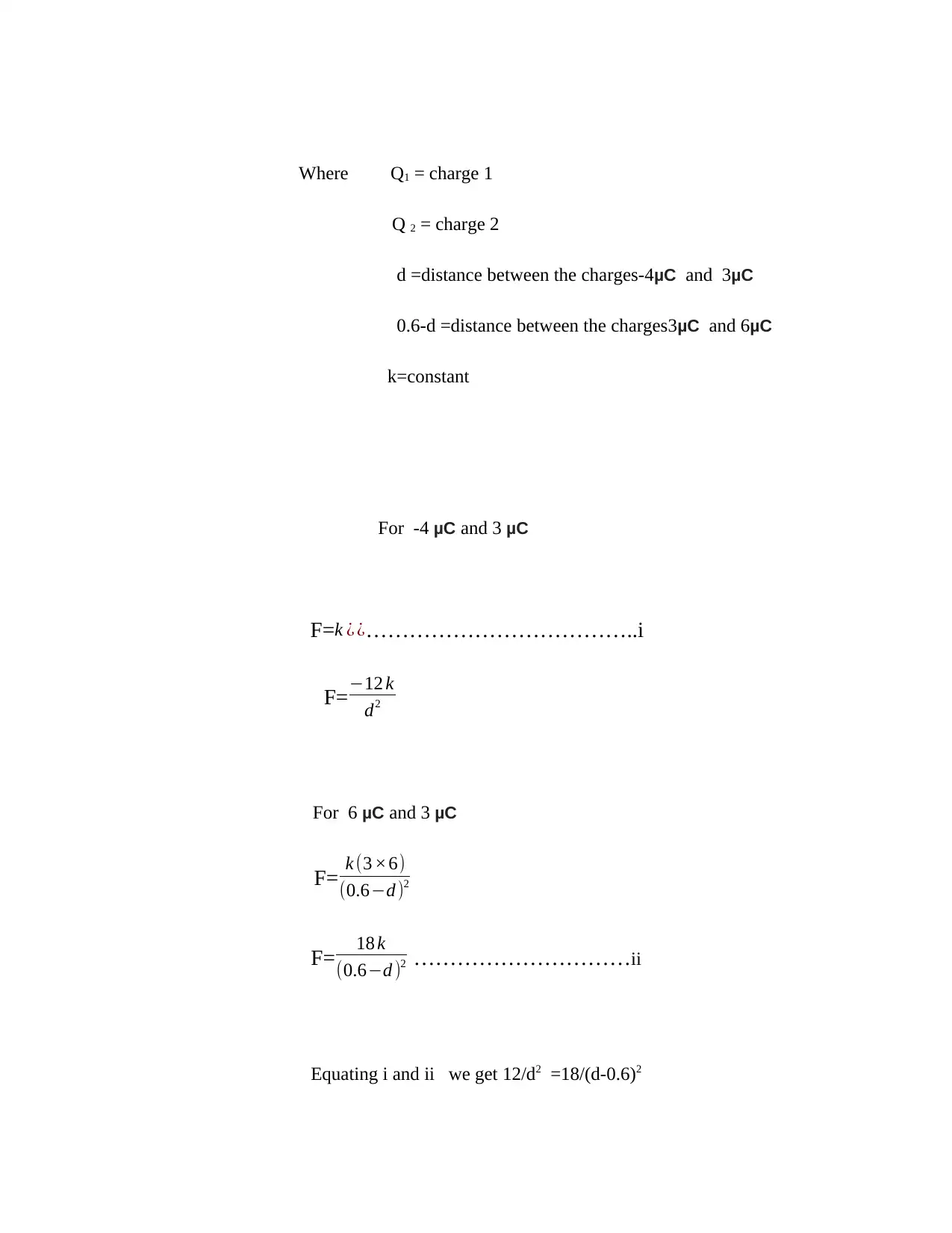
Where Q1 = charge 1
Q 2 = charge 2
d =distance between the charges-4μC and 3μC
0.6-d =distance between the charges3μC and 6μC
k=constant
For -4 μC and 3 μC
F=k ¿ ¿………………………………..i
F=−12 k
d2
For 6 μC and 3 μC
F= k (3 ×6)
(0.6−d )2
F= 18 k
(0.6−d )2 …………………………ii
Equating i and ii we get 12/d2 =18/(d-0.6)2
Q 2 = charge 2
d =distance between the charges-4μC and 3μC
0.6-d =distance between the charges3μC and 6μC
k=constant
For -4 μC and 3 μC
F=k ¿ ¿………………………………..i
F=−12 k
d2
For 6 μC and 3 μC
F= k (3 ×6)
(0.6−d )2
F= 18 k
(0.6−d )2 …………………………ii
Equating i and ii we get 12/d2 =18/(d-0.6)2
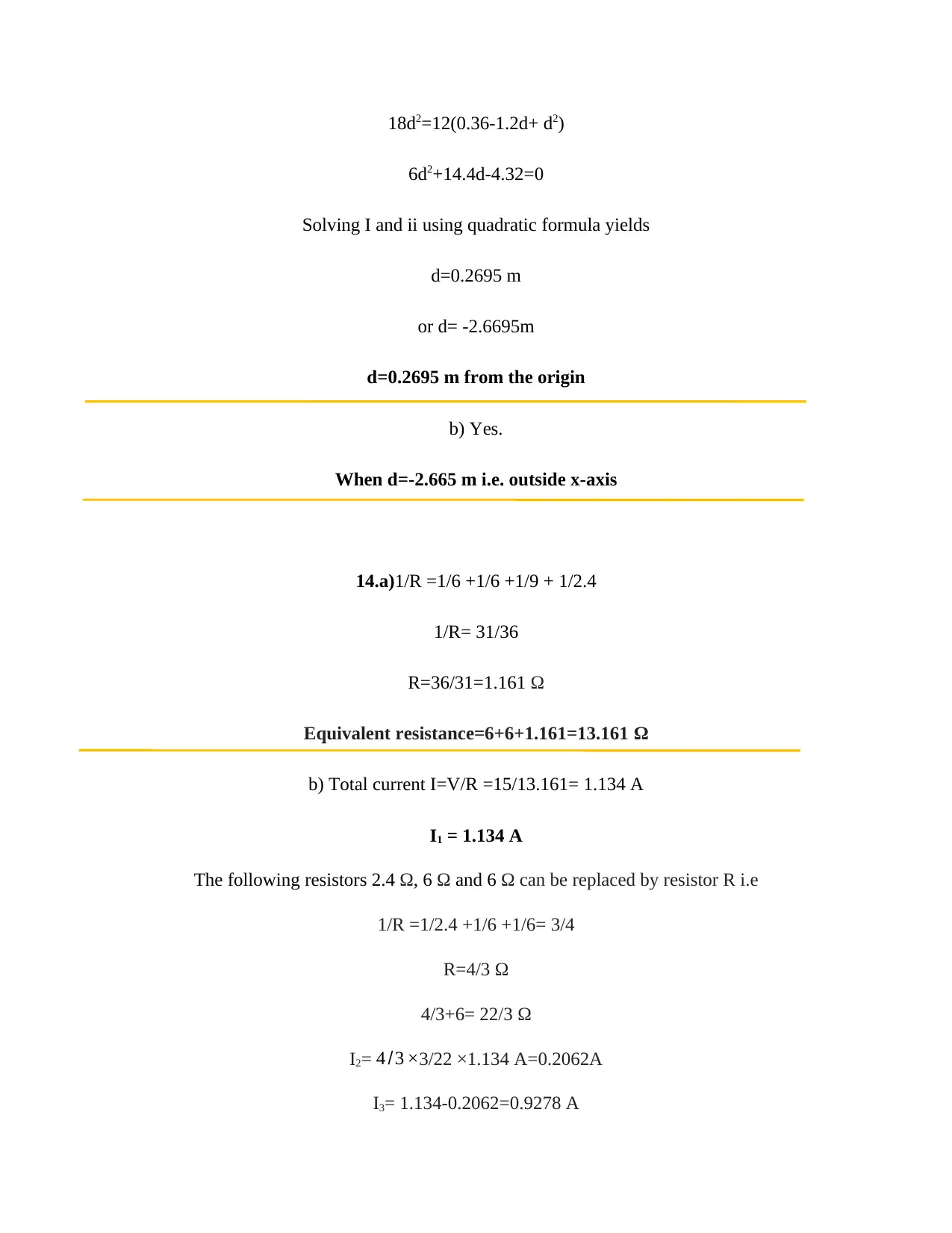
18d2=12(0.36-1.2d+ d2)
6d2+14.4d-4.32=0
Solving I and ii using quadratic formula yields
d=0.2695 m
or d= -2.6695m
d=0.2695 m from the origin
b) Yes.
When d=-2.665 m i.e. outside x-axis
14.a)1/R =1/6 +1/6 +1/9 + 1/2.4
1/R= 31/36
R=36/31=1.161 Ω
Equivalent resistance=6+6+1.161=13.161 Ω
b) Total current I=V/R =15/13.161= 1.134 A
I1 = 1.134 A
The following resistors 2.4 Ω, 6 Ω and 6 Ω can be replaced by resistor R i.e
1/R =1/2.4 +1/6 +1/6= 3/4
R=4/3 Ω
4/3+6= 22/3 Ω
I2= 4 /3 ×3/22 ×1.134 A=0.2062A
I3= 1.134-0.2062=0.9278 A
6d2+14.4d-4.32=0
Solving I and ii using quadratic formula yields
d=0.2695 m
or d= -2.6695m
d=0.2695 m from the origin
b) Yes.
When d=-2.665 m i.e. outside x-axis
14.a)1/R =1/6 +1/6 +1/9 + 1/2.4
1/R= 31/36
R=36/31=1.161 Ω
Equivalent resistance=6+6+1.161=13.161 Ω
b) Total current I=V/R =15/13.161= 1.134 A
I1 = 1.134 A
The following resistors 2.4 Ω, 6 Ω and 6 Ω can be replaced by resistor R i.e
1/R =1/2.4 +1/6 +1/6= 3/4
R=4/3 Ω
4/3+6= 22/3 Ω
I2= 4 /3 ×3/22 ×1.134 A=0.2062A
I3= 1.134-0.2062=0.9278 A
Secure Best Marks with AI Grader
Need help grading? Try our AI Grader for instant feedback on your assignments.
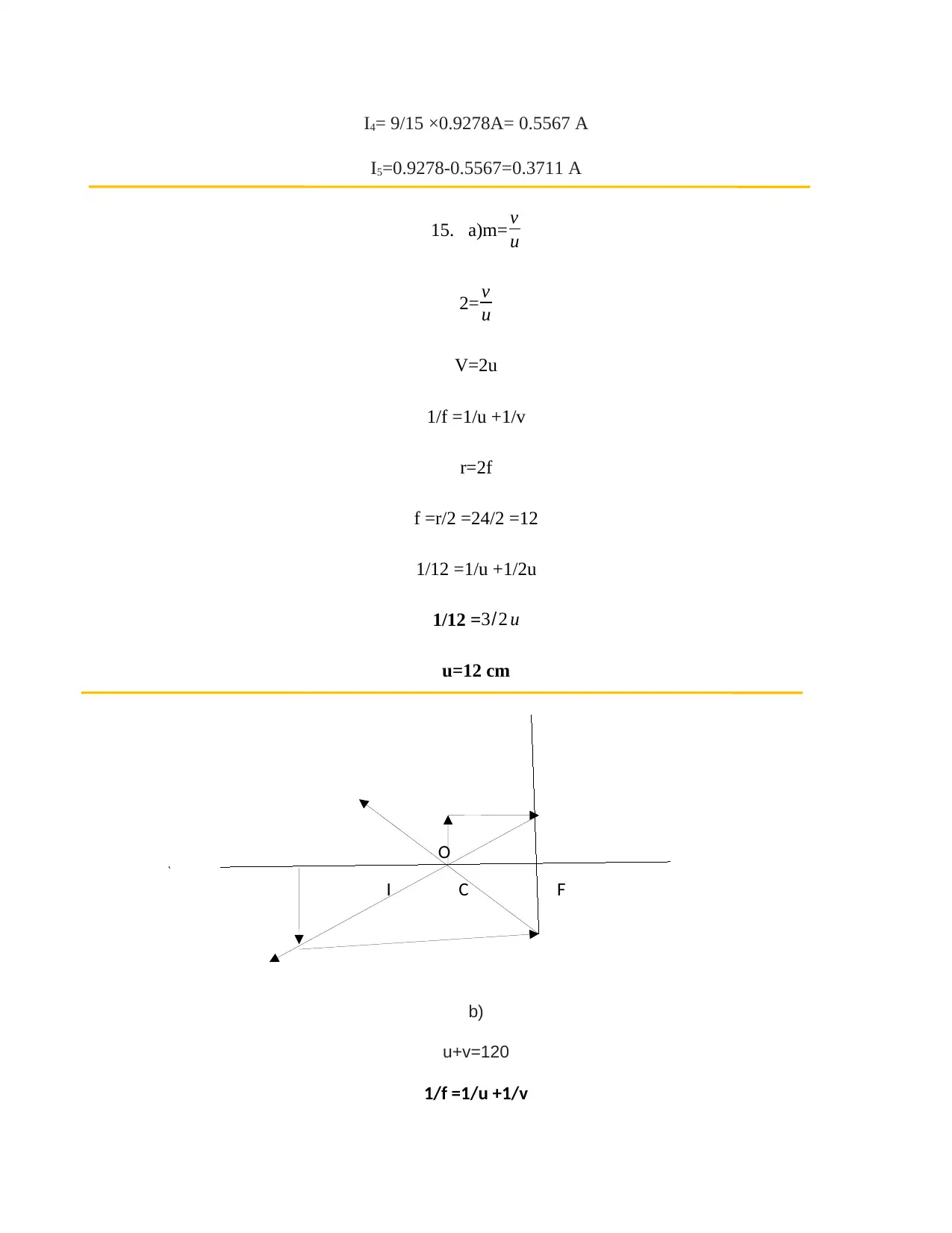
I4= 9/15 ×0.9278A= 0.5567 A
I5=0.9278-0.5567=0.3711 A
15. a)m= v
u
2= v
u
V=2u
1/f =1/u +1/v
r=2f
f =r/2 =24/2 =12
1/12 =1/u +1/2u
1/12 =3/2 u
u=12 cm
O
I C F
b)
u+v=120
1/f =1/u +1/v
I5=0.9278-0.5567=0.3711 A
15. a)m= v
u
2= v
u
V=2u
1/f =1/u +1/v
r=2f
f =r/2 =24/2 =12
1/12 =1/u +1/2u
1/12 =3/2 u
u=12 cm
O
I C F
b)
u+v=120
1/f =1/u +1/v
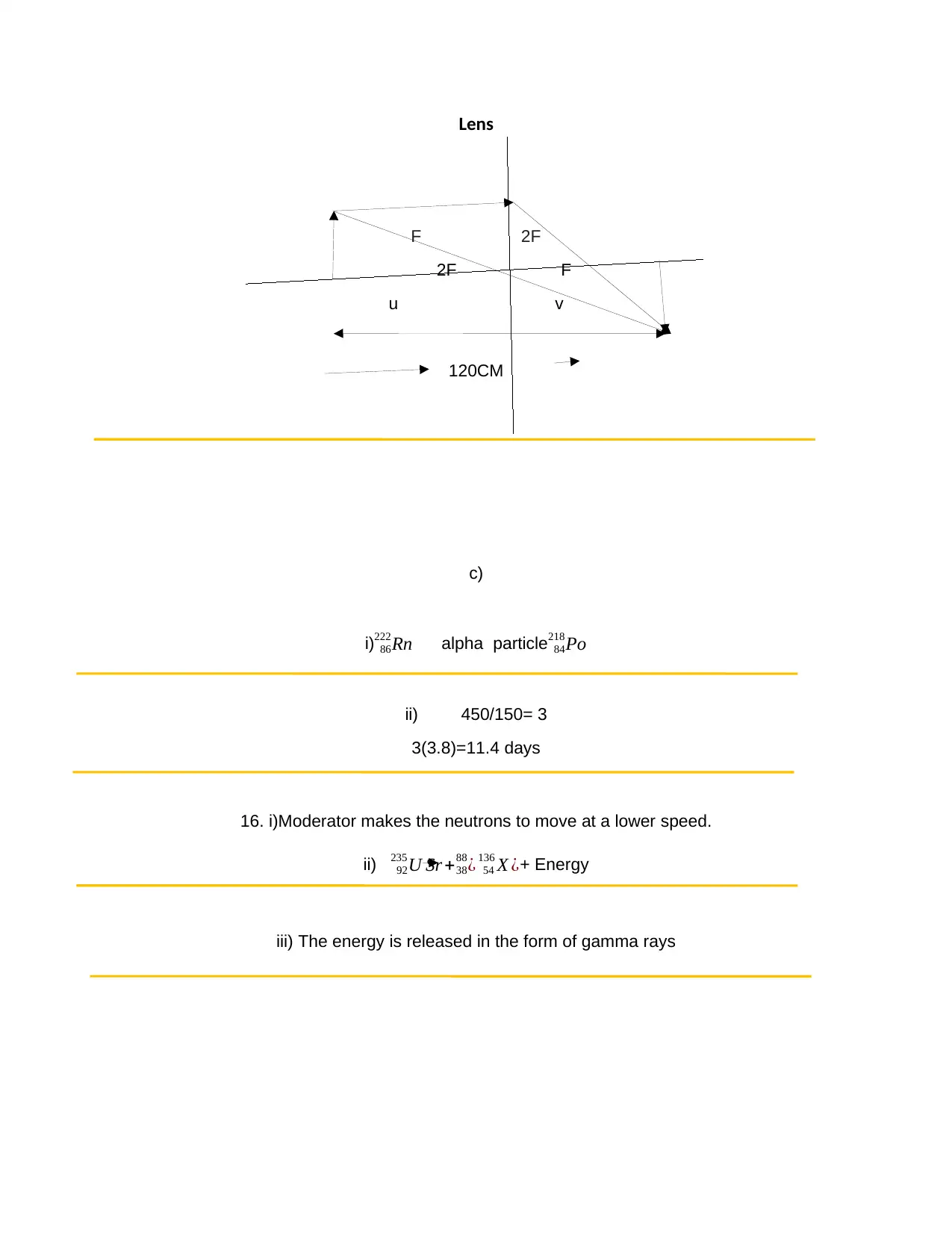
Lens
F 2F
2F F
u v
120CM
c)
i) Rn86
222 alpha particle Po84
218
ii) 450/150= 3
3(3.8)=11.4 days
16. i)Moderator makes the neutrons to move at a lower speed.
ii) U92
235 Sr + ¿38
88 X54
136 ¿+ Energy
iii) The energy is released in the form of gamma rays
F 2F
2F F
u v
120CM
c)
i) Rn86
222 alpha particle Po84
218
ii) 450/150= 3
3(3.8)=11.4 days
16. i)Moderator makes the neutrons to move at a lower speed.
ii) U92
235 Sr + ¿38
88 X54
136 ¿+ Energy
iii) The energy is released in the form of gamma rays
1 out of 18
Related Documents
Your All-in-One AI-Powered Toolkit for Academic Success.
+13062052269
info@desklib.com
Available 24*7 on WhatsApp / Email
![[object Object]](/_next/static/media/star-bottom.7253800d.svg)
Unlock your academic potential
© 2024 | Zucol Services PVT LTD | All rights reserved.





